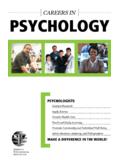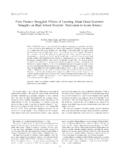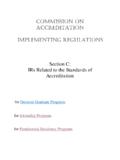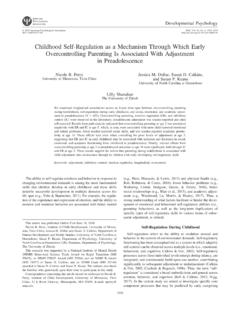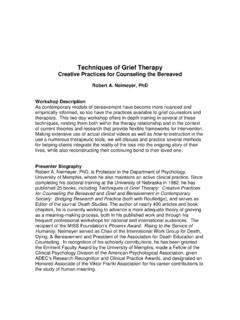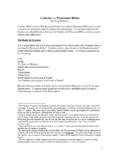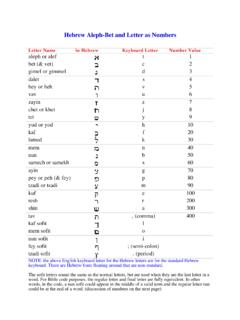Transcription of The Secret to Happiness - American Psychological …
1 The Secret to Happiness : Feeling Good or Feeling Right?Maya TamirThe hebrew UniversityShalom H. SchwartzThe hebrew University and National ResearchUniversity Higher School of EconomicsShige OishiThe University of VirginiaMin Y. KimKeimyung UniversityWhich emotional experiences should people pursue to optimize Happiness ? According to traditional subjectivewell-being research, the more pleasant emotions we experience, the happier we are. According to Aristotle,the more we experience the emotions we want to experience, the happier we are. We tested both predictionsin a cross-cultural sample of 2,324 participants from 8 countries around the world. We assessed experiencedemotions, desired emotions, and indices of well-being and depressive symptoms.
2 Across cultures, happierpeople were those who more often experienced emotions they wanted to experience, whether these werepleasant ( , love) or unpleasant ( , hatred). This pattern applied even to people who wanted to feel lesspleasant or more unpleasant emotions than they actually felt. Controlling for differences in experienced anddesired emotions left the pattern unchanged. These findings suggest that Happiness involves experiencingemotions that feel right, whether they feel good or : Happiness , well-being, emotion, culture, motivationSupplemental materials: often defined as a state of well-being and con-tentment (Merriam-Webster, ). It is perhaps one of the mostsalient of human pursuits (Diener, Sapyta, & Suh, 1998).
3 How canone attain this state of well-being? One answer is by increasingpleasure and decreasing pain (Kahneman, 1999). Indeed, somepsychologists argue that Happiness involves maximizing pleasantemotions and minimizing unpleasant emotions ( , Diener, 1984;Kahneman, Diener, & Schwarz, 1999; Kuppens, Realo, & Diener,2008; Lucas, Diener, & Suh, 1996). This approach has dominatedthe field of subjective well-being (SWB) over the last 30 years (seeDiener, 2013, for a recent review). The present article exploresanother possible answer based on the Aristotelian approach. Aris-totle suggested that Happiness involves feeling the right emotions are not necessarily pleasant emotions and may even beunpleasant, like anger or fear (Thomson, 1955).
4 Indeed, Aristotle heldthat the absence of unpleasant emotions isnotan indicator of happi-ness. Instead, Happiness is linked to feeling unpleasant emotions whenthey are appropriate and goal-conducive. The present research is afirst attempt to test whether feeling the right emotions may be criticalin attaining Are the Right Emotions?For Aristotle, Happiness entails experiencing the right emotions(Nicomachean Ethics, 1105b25 6). In Book 2 of NicomacheanEthics, Aristotle states that to have these feelings at the righttimes on the right grounds towards the right people for the rightmotive and in the right way is (..) the mark of virtue (1106b9 1107a1; Thomson, 1955, p. 101). Anger, fear, as well as pleasureare right, for some people, for some reasons.
5 For example, for aminority group member who seeks justice because people in themajority mistreat him, feeling anger may just be the right an emotion is right, therefore, depends on the goals andneeds of each individual. Whereas anger may feel right to some, itmay feel wrong to others. Happiness , according to Aristotle,should involve feeling emotions that people deem to be appropri-ate given their needs and motives. Building on Aristotle s account,therefore, we define feeling right as feeling emotions that oneconsiders to be emotions people consider desirable differs systematicallyacross situations, individuals, and cultures. Individuals differ in theextent to which they desire pleasant states.
6 For instance, whereassome individuals desire high arousal pleasant emotions, such asexcitement, others desire low activation pleasant emotions, such asThis article was published Online First August 14, Tamir, Department of Psychology, The hebrew University; Sha-lom H. Schwartz, Department of Psychology, The hebrew University; andDepartment of Psychology, National Research University Higher Schoolof Economics, Moscow; Shige Oishi, Department of Psychology, TheUniversity of Virginia; and Min Y. Kim, Department of Psychology,Keimyung work was supported by Grant 794/11 from the Israel ScienceFoundation. We thank Jan Cieciuch, Michaela Riediger, Claudio Torres,Christie Scollon, Vivian Dzokoto, and Xiaolu Zhou for their help with datacollection.
7 The ideas and data presented in this article were previouslypresented at colloquium talks at the hebrew University and University ofCalifornia, concerning this article should be addressed to MayaTamir, Department of Psychology, The hebrew University, Mount Scopus,Jerusalem, 91905, Israel. E-mail: of Experimental Psychology: General 2017 American Psychological Association2017, Vol. 146, No. 10, 1448 14590096-3445/17/$ (Rusting & Larsen, 1995). This pattern also differs byculture, such that Americans, on average, desire high arousalpleasant emotions more than East Asians do (Tsai, Knutson, &Fung, 2006). Individuals also differ in the extent to which theydesire unpleasant states. For instance, European Americans seemto be more motivated to minimize unpleasant states, comparedwith Germans (Koopmann-Holm & Tsai, 2014).
8 In addition,whereas European Americans seek to maximize pleasant experi-ences and minimize unpleasant experiences, members of collec-tivistic cultures seek more balanced emotional experiences, and areless motivated to minimize unpleasant experiences ( , Miy-amoto, Ma, & Petermann, 2014; Sims et al., 2015).We have recently proposed that people s values are one factorthat might determine which emotions they desire (Tamir et al.,2016). In a cross-cultural study, we found that people desiredemotions that were consistent with their core values. For instance,individuals who valued self-transcendence (benevolence, univer-salism) desired more love, trust, and compassion ( , self-transcending emotions) than others did, whereas those who valuedself-enhancement (power, achievement) desired more pride, butalso more anger, hatred and contempt ( , self-enhancing emo-tions) than others claimed that feeling emotions that are consistent withone s values feels right, and feeling right relates to greater happi-ness.
9 Is this indeed the case? Furthermore, is this the case evenwhen the right emotions are unpleasant to experience? To addressthese questions, the present investigation tested whether individu-als are happier if they experience the emotions they desire than ifthey do not, whether the emotions are pleasant or assessed the degree to which a person feels the right emo-tion by computing the discrepancy between the amount of theemotion the person desires to feel and the amount of that emotionthe person actually feels. Previous research on pleasant emotionsfound that the smaller the discrepancy between experienced anddesired pleasant states, the more satisfied people are ( , K mpfe& Mitte, 2009; Larsen & McKibban, 2008; Rice, McFarlin, &Bennett, 1989).
10 When individuals desire pleasant emotions, theAristotelian prediction is the same as the prediction of traditionalSWB researchers: people are happier if they experience as much ofa pleasant emotion as they desire. However, when people desireunpleasant emotions, the Aristotelian prediction and the predictionof traditional SWB researchers are in stark contrast. The Aristo-telian prediction is that such people would be happier the morethey feel the emotion they desire, even though that emotion isunpleasant. The traditional SWB prediction is that people would behappier the less they feel that unpleasant emotion, whether theydesire it or not. That is because SWB researchers typically treatpleasant emotions as good and unpleasant emotions as bad (at leastfor SWB; Diener, 1984; Kahneman, 1999).



